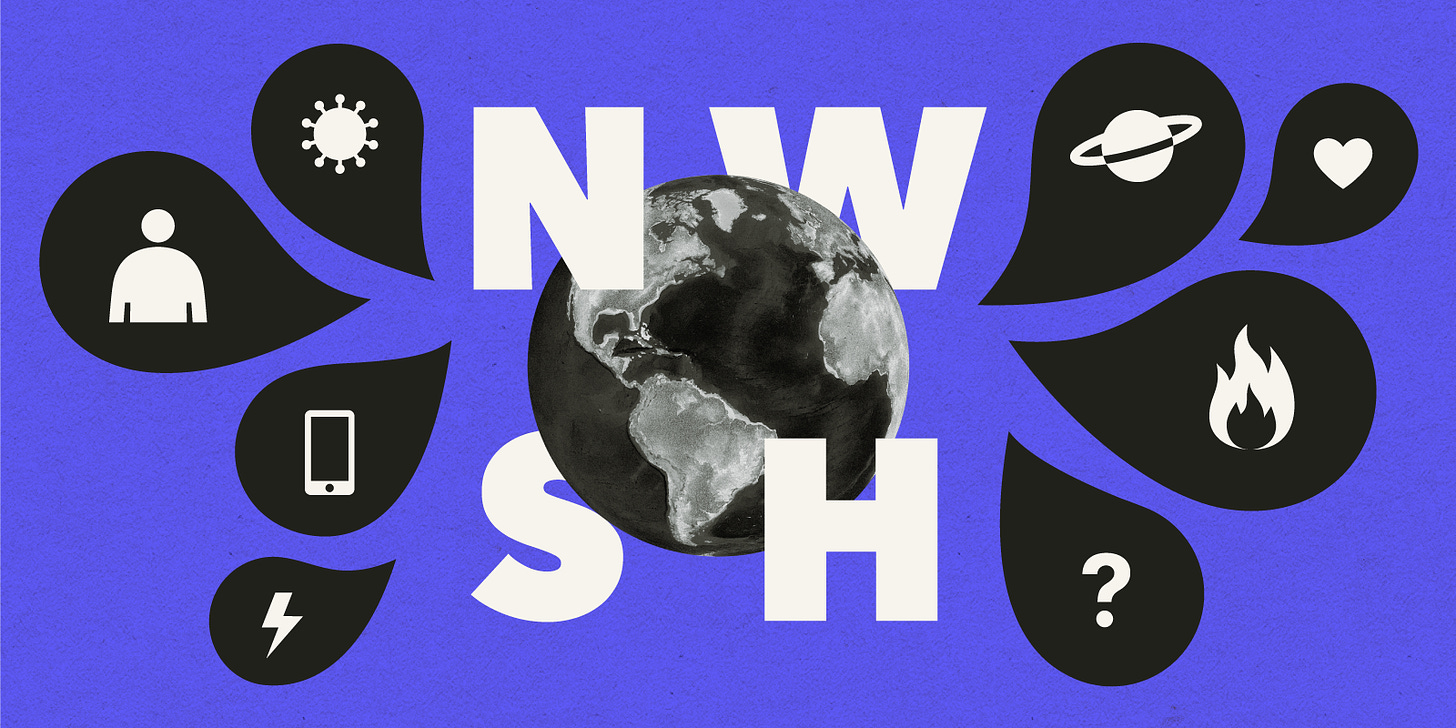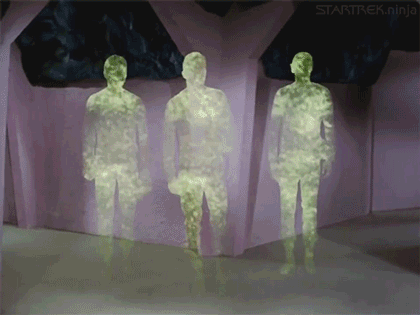New Week Same Humans #56
Can we teach an AI what it's like to have a body? Ireland trials a basic income for artists. Plus more news and analysis from this week.
Welcome to the mid-week update from New World Same Humans, a newsletter on trends, technology, and society by David Mattin.
If you’re reading this and you haven’t yet subscribed, join 18,000+ curious souls on a journey to build a better shared future 🚀🔮
💡 In this week’s Sunday note I wrote about a transparency revolution sweeping through the world’s most valuable company. Go here to read People in Glass Boxes.💡
This week, the European Parliament moves against facial recognition systems, including the controversial Clearview AI.
William Shatner makes it to space, and cries on Jeff Bezos’s shoulder. And Ireland trials a basic income for artists.
Let’s go!
👁️ The walls have AIs
The European Parliament wants to ban police use of facial recognition, AI-fuelled predictive profiling of citizens, and privately-owned facial recognition databases.
MEPs voted overwhelmingly in favour of this week’s non-binding resolution to constrain the use of these technologies.
Meanwhile, the CEO of controversial facial recognition startup Clearview AI boasted that the company’s vast database now consists of over 10 billion profile pictures scraped from the web: three times more than had been reported. Clearview say they are also developing new tools, including deblur and mask removal, which can enable police to accurately predict the facial features of someone pictured wearing a mask.
In April, BuzzFeed revealed that Clearview AI is used by hundreds of police forces across the US. Their platform, and others like it, would be banned under the new rules proposed this week by the European Parliament.
⚡ NWSH Take: The resolution passed this week makes nothing happen. Still, it gives the clearest indication yet of the likely shape of EU legislation in this space. // A fascinating divergence is becoming apparent here: between the EU and China. Back in Algorithms with Chinese Characteristics, I wrote about the CCP’s plans to build an AI-fuelled technostate. Part of that plan? China’s social credit rating system, which will leverage facial recognition to monitor, rate, and control the behaviour of every citizen. The European Parliament explicitly called out this as the end-stage dystopia that they hope to prevent with their new proposed rules. In short: we don’t want to become China. // Two power blocks, two wildly different approaches to AI. Which will thrive? As for the US, their collective stance is undecided; but this week saw White House scientists call for a new AI Bill of Rights.
🧑🚀 These are the adventures
It was on, then off, then on again. But this week – just a few hours ago at the time of writing – it finally happened.
William Shatner went to space. At 90, he becomes the oldest person ever to leave the Earth.
Yes, it’s cool that Captain Kirk got to boldy go. And I’m intrigued, even moved, by his account – tearfully delivered to fellow astronaut Jeff Bezos – of the ten-minute suborbital flight and the spiritual experience it engendered (see the video).
On the other hand, regular readers are familiar with my scepticism when it comes to the billionaire space race.
Bezos didn’t alight on Captain Kirk as a co-rider by accident. As this slick Shatner pre-flight video also reminds us, his involvement is a clever PR play. One intended to associate Blue Origin with warm feelings, a sense of fun, and a final frontier spirit.
Media coverage has been intense; the experiment worked. Expect more of the same. Will Mark Hamill be next?
🧑💻 Working for days
News emerged this week that Belgium is close to approving a four-day work week.
Consensus over the change is emerging among the seven parties(!) in the country’s coalition government. ‘The corona crisis has radically changed the way we work,’ says a spokesperson for the Economy and Labor Ministry. ‘The idea is to give workers more flexibility to organize their working week.’
Meanwhile, next year will see Ireland trial a basic income scheme for artists and art workers. The three-year pilot will see some Irish artists given a weekly payment to live on; the amount has not yet been confirmed.
⚡ NWSH Take: The Belgian four-day week comes with a major caveat; employees will be expected to work the same number of hours per week as they did before. Still, in the Global North the five-day work week has been holy writ for 100 years; if this happens, it’s a big move. // Back in March I wrote on why the debate over UBI is set to explode. Here are further reminders that the convulsion we’ve just lived through has shifted the conversation on work, income, and government’s proper role in the economy. // In a near-future of automated abundance, industrialised nations will have enough to cover everyone’s basic material needs. The challenge will be to reach political agreement on sharing that wealth. If we can do that, a new vision of life inside advanced modernity becomes possible; one that is less about ‘jobs’, and more about caring for one another. But the road to that consensus is long, and full of obstacles.
🤖 Do the robot
This week, researchers plunged deeper into the mysteries of robot embodiment.
If we’re to achieve the dream of fully autonomous and properly helpful robots, we need AIs that can control physical bodies in complex real-world environments. In other words, we need to teach robots how to have a body.
One indication of how far we have to go: in a new post this week, DeepMind discuss their work to train a robot arm to stack blocks of an irregular size and shape.
The featured video is at uneventful but eery; maybe that’s because we also get toddlers to master embodiment by stacking blocks. DeepMind say their work shows that reinforcement learning via a combination of simulation and real-world data holds promise when it comes to creating robots that can cope with the world around them.
Meanwhile, researchers from ETH Zurich and Nvidia are working in the same space. See this week’s news on how they created a virtual world and populated it with 4,000 simulated robots, called ANYmals.
This simulation was used to train the four-legged ANYmals to navigate stairs, slopes, and steep drops; Nvidia say their AI chips allowed the training to take place in less than one hundredth of the time usually needed.
⚡ NWSH Take: Inside bounded systems governed by rules, AIs are superhuman. But the physical world is messy, ambiguous, and always in flux. That is why machines thrash the world’s best human chess players, but we still don’t have a robot that can tidy the kitchen. // That’s the dream, here: a general-purpose helper robot of the kind we were promised by 1960s futurists. But we shouldn’t forget the nightmare in sight, too. Back in New Week #51 we saw how Singapore authorities are trialling a patrol by Boston Dynamics robots in the Toa Payoh Central district; this week came reports that, unsurprisingly, some are uneasy about the surveillance implications. Meanwhile, a startup called Ghost Robotics proudly displayed their latest creation this week: a robot dog with a sniper rifle strapped to it. // DeepMind and others are questing hard after a robot that can walk the walk. Machine surveillance agents and autonomous soldiers will follow, if we let them. So, will we?
🗓️ Also this week
🤑 An NFT project featuring 8,888 pictures of robots did $60 million in first and secondary sales before the artworks were even revealed. Those numbers make MekaVerse, which in inspired by the classic Japanese mecha anime series Mobile Suit Gundam, one of the most lucrative NFT launches ever. The full series of Mekas have now been unveiled on trading platform OpenSea.
🏭 China says it will build more coal-fired power plants. The announcement comes in the wake of a series of recent blackouts; observers say China may be winding back its commitment to reach peak carbon emissions by 2030.
🏢 Amazon has rowed back on plans to insist staff return to the office next year. Instead, WFH decisions will be left to individual team managers. Amazon previously said it wanted an ‘office-centric culture as our baseline.’
₿ The US has overtaken China as the world’s biggest bitcoin-mining hub. The CCP recently declared both crypto-mining and all crypto transactions illegal.
🚗 Norway will sell its last petrol car some time in early 2022 according to a new analysis. The Norwegian Automobile Federation say sales of electric vehicles are rapidly eclipsing those of traditional cars.
🌳 People keep trying to sell parts of the Amazon rainforest on Facebook Marketplace. Facebook say they’ll clamp down on the illegal sales, which often relate to protected areas including land reserved for indigenous peoples.
☀️ A new study says extreme heat is exposing people in big cities to deadly temperatures. Researchers at Washington State University, Vancouver, say inhabitants of major cities experience extreme heat three times more often than they did in 1980. The problem is worst in the developing world, where urbanization is at its fastest.
🪐 NASA’s Perseverance rover has identified rocks with the potential to contain fossils of Martian life. The rocks are in the Jezero crater, which is believed to have once hosted a huge lake.
🌍 Humans of Earth
Key metrics to help you keep track of Project Human.
🙋 Global population: 7,899,604,007
🌊 Earths currently needed: 1.7945877552
💉 Global population vaccinated: 35.4%
🗓️ 2021 progress bar: 78% complete
📖 On this day: On 13 October 1908 the British suffragette Margaret Travers Symons broke into the UK Parliament’s debating chamber and became the first woman to speak there.
Trek On
Thanks for reading this week.
Time and again, astronauts tell us that looking down at the Earth from space sparks a perspective shift that offers new insight into the wonder, and fragility, of us. The phenomenon is known as the Overview Effect.
New World Same Humans can’t (yet) offer a ride into space. But it does attempt to deliver something akin to that kind of jolt. Its fuel is a central thesis that asks us to view a changing world through the lens of our shared human nature.
If that mission resonates with you, there’s one thing you can do to help: share!
Now you’ve reached the end of this week’s instalment, why not forward the email to someone who’d also enjoy it? Or share it across one of your social networks, with a note on why you found it valuable. Remember: the larger and more diverse the NWSH community becomes, the better for all of us.
I’ll be back this Sunday. Until then, be well,
David.
P.S Huge thanks to Nikki Ritmeijer for the illustration at the top of this email. And to Monique van Dusseldorp for additional research and analysis.




